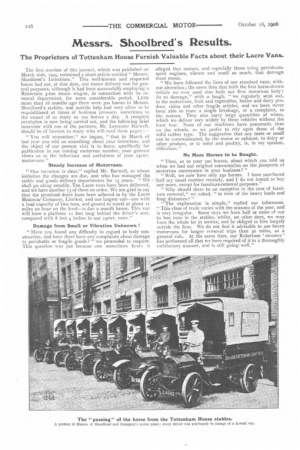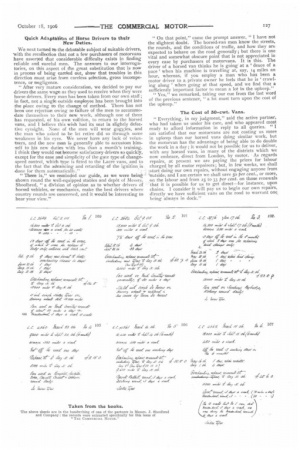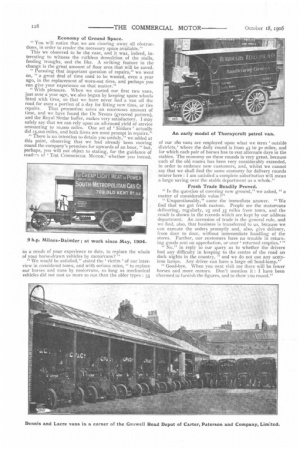Messrs. Shoolbred' s Results.
Page 14

Page 15

Page 16

If you've noticed an error in this article please click here to report it so we can fix it.
The Proprietors of Tottenham House Furnish Valuable Facts about their Lacre Vans.
The first number of this journal, which was published on March teth, 1935, contained a short article entitled" Messrs. Shoolbred's Intentions." This well-known and respected house had not, at that date, one motor delivery van for general purposes, although it had been successfully employing a Robertson 5-ton steam wagon-, in connection with its removal department, for some considerable period. Little more than 18 months ago there were 300 horses in Messrs. Shoolbred's stables, and outside help had very often to be requisitioned at times of business pressure, sometimes to the extent of as many as too horses a day. A complete revolution is now being carried out, and the following brief interview with one of the partners, Mr. Levcester Harwell, should be of interest to many who will read these pages :—
" You will remember," we began, " that in March of last year you told us something about your intentions, and the object of our present visit is to learn, specifically for publication in our coining motorvan number, your general views as to the behaviour and usefulness of your 24cwt. motorvans."
Steady Increase of Motorvans.
" Our intention is clear," replied, Mr. Barwell, to whose initiative the changes are due, and who has managed the stable and goods delivery departments for 13 years. " We shall go along steadily. Ten Lacre vans have been delivered, and we have another 13 of them on order. We are glad to say that the promised dates have been adhered to by the Lacre Motorcar Company, Limited, and our largest van—one with a load capacity of two tons, and geared to travel at about 12 miles an hour on the level—is due a month hence. This van will have a platform 11 feet long behind the driver's seat, compared with 8 feet 4 inches in our 24cwr. vans."
Damage from Smell or Vibration Unknown "Have you found any difficulty in regard to body construction, and have there been any complaints about damage to perishable or fragile goods?" we proceeded to enquire. This question was put because one sometimes hears it
alleged that motors, and especially those using petroleumspirit engines, vibrate and smell so much, that damage must ensue.
"We have followed the lines of our standard vans, without alteration ; the same firm that built the first horse-drawn vehicle we ever used also built our first motorvan body ! As to damage," with a laugh, " we regularly send out, in the motorvans, fruit and vegetables, butter and dairy produce, china and other fragile articles, and we have never been able to trace a single breakage, or a complaint, to the motors. They also carry large quantities of wines, which we deliver very widely by these vehicles without the least fear. None of our machines have pneumatic tires on the wheels, as we prefer to rely upon those of the solid rubber type, The suggestion that any taste or smell can be communicated, by the motor or exhaust, to dairy or other produce, or to meat and poultry, is, in my opinion, ridiculous."
No More Horses to be Bought.
"Then, as to your 300 horses, about which you told us when we had our original conversation on the prospects of rnotorvan conveyance in your business?"
"Well, we now have only 250 horses. I have purchased half my usual number recently, and I do not intend to buy any more, except for furniture-removal purposes."
"Why should there be an exception in the case of furniture removal," we asked, "in view of the heavy loads and long distances? " "The explanation is simple," replied our informant. "This class of trade varies with the seasons of the year, and is very irregular. Some days we have half or more of our 6o box vans in the stables, whilst, on other days, we may have the whole lot in service, and be obliged to hire largely outside the firm. We do not find it advisable to use heavy motorvans for longer removal trips than so miles, as a general rule. At the same time, our Robertson ' steamer ' has performed all that we have required of it in a thoroughly satisfactory manner, and is still going well."
quick Ada,pthtittn of Horse Drivers to their New Duties.
We next turned tb the debatable subject of suitable drivers, with the recollection that not a few purchasers of motorvans have asserted that considerable difficulty exists in finding reliable and careful men. The answers to our interrogatories, on this aspect of the great substitution that is now in process of being carried out, show that troubles in this direction must arise from careless selection, gross incompetence, or negligence.
"After very mature consideration, we decided to pay our drivers the same wage as they used to receive when they were horse drivers. Every man has been taken from our own staff ; in fact, not a single outside employee has been brought into the place owing to the change of method. There has not been one rejection owing to failure of the men to accommodate themselves to their new work, although one of them has requested, of his own volition, to return to the horsed vans, and I believe this wish had its seat in slightly defective eyesight_ None of the men will wear goggles, and the man who asked to he let retire did so through some weakness in his eyes. We never have any lack of volunteers, and the new ntan is generally able to accustom himself to his new duties with less than a month's training. I think they would net [become satisfactory drivers so quickly, -except for the ease and simplicity of the gate type of changespeed control, which !type is fitted to the Lacre vans, and to the fact that the advancing and retarding of the ignition is done for them automatically." "The is," we teeminded our guide, as we were being shown round the well-equipped stables and clop& of Messrs. Shoolbred, "a &Vision of opinion as to whether drivers of horsed vehicles, (or mechanics, make the best drivers where country rounds ave concerned, and it would be interesting to hear your view."' " On that point," came the prompt answer, "I have not the slightest doubt. The horsed-van men know the streets, the rounds, and the conditions of traffic, and how they are expected to behave on the road generally ; but there is one vital and somewhat obscure point that is not appreciated in every case by purchasers of motorvans. It is this. The driver of a horsed van thinks he is going at a ' deuce of a pace' when his machine is travelling at say, 54 miles an hour, whereas, if you employ a man who has been a motor driver to a private owner he feels that he is 'crawling along ' when going at that speed, and we find that a sufficiently important factor to mean a lot in the upkeep."
" Yes," we remarked, taking our cue from the last word of the previous sentence, "a lot must turn upon the cost of the upkeep."
The Cost of 30-cwt. Vans.
" Everything, in my judgment," said the active partner, who had taken us under his care, and who appeared most ready to afford information in reply to all queries. " I sun satisfied that our motorvans are not costing us more in upkeep than our horsed vans doing similar work, but the motorvan has the advantage of being able to do double the work in a day ; it would not be possible for us to deliver, with any horsed vans, in many of the districts which we now embrace, direct from London, by motor. As regards repairs, at present we are paying the prices for labour charged by all motor repairers ; but, in few weeks, we shall -start doing our own repairs, without engaging anyone from
utside, and I am certain we shall save so per cent., or more, on the labour and from 25 to 33 per cent. on those renewals that it is possible for us to get direct-for. instance, upon chains. I consider it will pay us to begin our own repairs, directly we have sufficient vans on the road to warrant one, being always in dock." Economy of Ground Space. " You will notice that we are clearing away all obstructions, in order to render the necessary space available."
This we observed to be the case, and it was, indeed, interesting to witness the ruthless demolition of the stalls, feeding troughs, and the like. A striking feature in the change is the great amount of floor area that will be saved.
" Pursuing that important question of repairs," we went on, " a great deal of time used to be wasted, even a year ago, in the replacement of worn-out tires, and perhaps you can give your experience on that matter."
"With pleasure. When we started our first two vans, just over a year ago, we also began by keeping spare wheels fitted with tires, so that we have never had a van off the road for even a portion of a day for fitting new tires, or tire repairs. That precaution saves an enormous amount of time, and we have found the De Nevers (grooved pattern), and the Royal Sirdar buffer, makes very satisfactory. 1 may safely say that we can rely upon an all-round yield of service amounting to to,000 miles, One set of ' Sirdars ' actually did 15,000 miles, and both firms are most prompt in repairs."
"There is no intention to detain you unduly," we added at this point, observing that we had already been moving round the company's premises for upwards of an hour, "but, perhaps, you will not object to stating, for the guidance of read—s of THE COMMERCIAL MOTOR,' whether N.ou intend,
as a result of your experience to date, to replace the whole of your horse-drawn vehicles by motorvans? "
" We would be satisfied," stated the victim ' of our interview in considered tones, and with serious mien, " to replace our horses and vans by motorvans, so long as mechanical vehicles did not cost us more to run than the older tvpes 35
of our if3o vans are employed upon what we term 'outside districts,' where the daily round is from 45 to so miles, and for which each pair of horses has to rest alternate days in the stables. The economy on these rounds is very great, because each of the old routes has been very considerably extended, in order to embrace new customers, and, whilst we cannot say that we shall find the same economy for delivery rounds nearer here : I am satisfied a complete substitution will mean a large saving over the stable department as a whole."
Fresh Trade Readily Proved.
" Is the question of covering new ground," we asked, " a matter of considerable value?"
" Unquestionably," came the immediate answer. "We find that we get fresh custom. People see the motorvans delivering, regularly, 25 and 35 miles from town, and the result is shown in the records which are kept by our address department. An accession of trade is the general rule, and we find, also, that business is transferred to us, because we can execute the orders promptly and, also, give delivery, from door to door, without intermediate handling of the stores. Further, our customers have no trouble in returning goods sent on approbation, or over ' returned empties.' " " No," in reply to our query as to whether the drivers had any difficulty in keeping to the centre of the road on dark nights in the country, " and we do not use any acetylene lamps. Any driver can have a large oil head-lamp." " Good-bye. When you next visit me there will be fewer horses and more motors. Don't mention it : I have been charmed to furnish the figures, and to show you round."
































